Kochs postulates Study guides, Class notes & Summaries
Looking for the best study guides, study notes and summaries about Kochs postulates? On this page you'll find 8 study documents about Kochs postulates.
All 8 results
Sort by
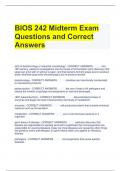
-
BIOS 242 Midterm Exam Questions and Correct Answers
- Exam (elaborations) • 24 pages • 2023
- Available in package deal
-
- $12.39
- + learn more
BIOS 242 Midterm Exam Questions and Correct Answers birth of biotechnology or industrial microbiology - CORRECT ANSWERS mid 19th century, pasteurs investigations into the cause of fermentation led to discovery that yeast can grow with or without oxygen, and that bacteria ferment grape juice to produce acids, whereas yeast cells ferment grape juice to produce alcohol. biotechnology - CORRECT ANSWERS microbes are intentionally manipulated to manufacture products. pas...
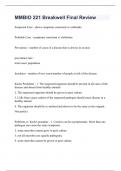
-
MMBIO 221 Breakwell Final Review
- Exam (elaborations) • 30 pages • 2024
- Available in package deal
-
- $13.99
- + learn more
Suspected Case - shows symptoms consistent w/ outbreaks Probable Case - symptoms consistent w/ definition Prevalence - number of cases of a disease that is always in an area prevelance rate= total cases/ population Incidence - number of new cases/number of people at risk of the disease Kochs Postulates - 1. The suspected organism should be present in all cases of the disease and absent from healthy animals 2. The suspected organism should be grown in pure culture 3. Cells from ...
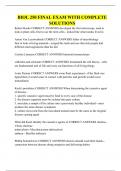
-
BIOL 250 FINAL EXAM WITH COMPLETE SOLUTIONS
- Exam (elaborations) • 15 pages • 2023
- Available in package deal
-
- $16.99
- + learn more
BIOL 250 FINAL EXAM WITH COMPLETE SOLUTIONS
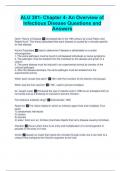
-
ALU 301- Chapter 4- An Overview of Infectious Disease Questions and Answers
- Exam (elaborations) • 6 pages • 2024
- Available in package deal
-
- $8.99
- + learn more
Germ Theory of Disease Developed late in the 19th century by Louis Pateur and Robert Koch. This theory postulated that each disease is caused by a microbe specific for that disease. Koch's Postulates Used to determine if disease is attributable to a certain microorganism: 1. The same pathogen must be found in all diseased individuals w/ same symptoms. 2. The pathogen must be isolated from the individual w/ the disease and grown in a culture. 3. The same disease must be induced in an exper...
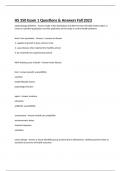
-
HS 350 Exam 1 Questions & Answers Fall 2023
- Exam (elaborations) • 6 pages • 2023
-
- $9.99
- + learn more
epidemiology definition - Answer study of the distribution and determinants of health-related states or events in specified populations and the application of this study to control health problems koch's four postulates - Answer 1. present in disease 2. capable of growth in pure cultures in lab 3. cause disease when injected into healthy animal 4. be rendered from experimental animal WHO leading cause of death - Answer heart disease host - Answer genetic susceptibility nutrition h...
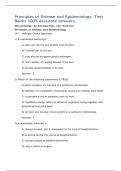
-
Principles of Disease and Epidemiology
- Exam (elaborations) • 17 pages • 2024
-
- $7.99
- + learn more
1) A commensal bacterium A) does not receive any benefit from its host. B) is beneficial to its host. C) may also be an opportunistic pathogen. D) isnt capable of causing disease in its host. E) always causes disease in its host. Answer: C 2) Which of the following statements is TRUE? A) Both members are harmed in a symbiotic relationship. B) Members of a symbiotic relationship cannot live without each other. C) A parasite is not in symbiosis with its host. D) Sy...
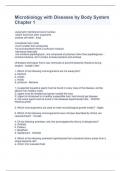
-
Microbiology with Diseases by Body System Chapter 1
- Exam (elaborations) • 5 pages • 2024
-
- $17.49
- + learn more
-eukaryotic membrane bound nucleus -obtain food from other organisms -posses cell walls - fungi -Unicellular lack nuclei -much smaller than eukaryotes -found everywhere there is sufficient moisture -reproduce asexually one contains peptidoglycan, one composed of polymers other then peptidoglycan - contains bacteria, don't contain archaea bacteria and archaea (Antiseptic technique) first to use chemicals to prevent bacterial infections during surgery - Joseph Lister 1. Which of the f...
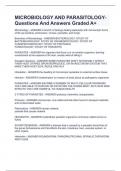
-
MICROBIOLOGY AND PARASITOLOGY-Questions And Answers Graded A+
- Exam (elaborations) • 11 pages • 2024
- Available in package deal
-
- $9.49
- + learn more
MICROBIOLOGY AND PARASITOLOGY-Questions And Answers Graded A+ Microbiology - ANSWER-A branch of biology dealing especially with microscopic forms of life (as bacteria, protozoans, viruses, parasites, and fungi). Branches of Microbiology - ANSWER-BACTERIOLOGY: STUDY OF BACTERIAVIROLOGY: STUDY OF VIRUSESMYCOLOGY: STUDY OF FUNGIPROTOZOOLOGY: STUDY OF PROTOZOA PARASITOLOGY: STUDY OF PARASITES PARASITES - ANSWER-An organism that lives in or on another organism, deriving nourishment at the e...

Do you wonder why so many students wear nice clothes, have money to spare and enjoy tons of free time? Well, they sell on Stuvia! Imagine your study notes being downloaded a dozen times for $15 each. Every. Single. Day. Discover all about earning on Stuvia


